

Gold represents many things, as well as being a chemical element with an interesting history and mythology. Humans seemed to be programmed to seek gold, be it connected to ancient myth about gods who came here to mine for gold and created humans as a slave race, or most importantly gold representing the alchemy of consciousness in time.
Gold has been highly valued in many societies throughout the ages. In keeping with this it has often had a strongly positive symbolic meaning closely connected to the values held in the highest esteem in the society in question. Gold may symbolize power, strength, wealth, warmth, happiness, love, hope, optimism, intelligence, justice, balance, perfection, summer, harvest and the sun.
In the search for the lost gold of El Dorado, I find it amusing that the title of the book, and future screenplay, is The Lost City of Z as Z is my guide and the end of the story. Z takes us to many adventures on Crystalinks where all things lead back to Zoroaster in his many guises. The story of Z began at the beginning with the Sumerian Gods and the Garden of Eden.
May 1925 ... Amazon Jungle ... Colonel Percy Harrison Fawcett, a British archaeologist and explorer, along with his son, Jack, disappear under unknown circumstances during an expedition to find what he believed to be an ancient lost city in the uncharted jungles of Brazil. Their quest was to find the Lost City of Z or El Dorado (Spanish for "the golden one"), a legend that began with the story of a South American tribal chief who covered himself with gold dust and would dive into a lake of pure mountain water. Imagined as a place, El Dorado became a kingdom, an empire, the city of this legendary golden king. (This story has many metaphors.)
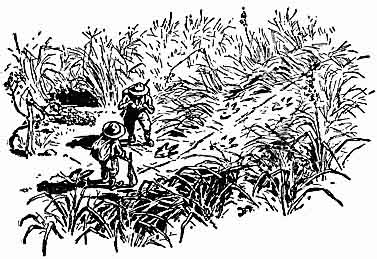
Fawcett always preferred to travel light, with companions who could be relied upon to negotiate the dangers that confronted them. Small groups of people were also less likely to attract the attention of hostile Indian tribes.
On May 29th, 1925, Fawcett telegraphed his wife saying that they were ready to enter unexplored territory in the region of the Upper Xingu, a tributary of the Amazon River. He said that they had sent the rest of the party back on account of the dangers posed by the local Indians, and that just the three of them would be going on. His message ended with the words; "You need have no fear of failure."
This was the last that anyone heard of the expedition. The three men vanished into the jungle and were never heard from again. No sooner had the group disappeared than rumors of their fate began to circulate. Some thought they had met their death at the hands of the Indians, while others were convinced they had died of disease or fallen prey to wild animals.
Percy Fawcett's son Brian made two trips to the area to try to solve the mystery of their disappearance, but returned without success. But stories of a lost city of antiquity hidden deep in the jungles of the Mato Grosso continue to persist, and in the decades that have followed, more than a hundred people have lost their lives in their quest to find this lost city of Paititi.
Yet the haunting thought remains. Could Percy Fawcett actually have succeeded in finding his city of "Z" after all, but was prevented from leaving by the local Indians who guarded the site? Up to the time of her death, Fawcett's wife remained convinced that her husband had achieved his goal, and had lived for many years in the city of his dreams.
Perhaps we shall never know, for the existence of this lost city has until now remained hidden in the mists that shroud the jungles of the Mato Grosso. These jungles guard their secrets well, for as the Oracle of Tolemac has written:
The world might have forgotten about the hoary legends of Paititi if it had not been for the tales of a Swiss hotelier who visited South America in 1972, and met with a reclusive man with a sensational story to tell. The name of the Swiss writer was Erich von Daniken, and the man that he met was Juan Moricz.
At the time of their meeting Erich von Daniken was a successful author with a provocative theme. He had already published two books which had captured the popular imagination of the world and become instant best-sellers. These books were "Chariots of the Gods" and "Return to the Stars".
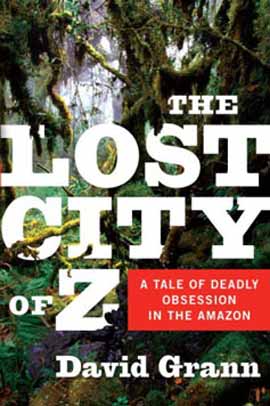
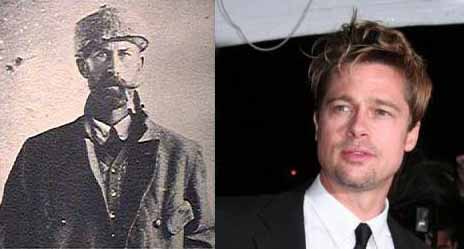
Q&A with David Grann, author of The Lost City of Z -- March 26, 2009
In 1925, Colonel Percy Harrison Fawcett -- at the time, perhaps the most famous explorer on Earth -- journeyed into the heart of the Amazon on a quest to find The Lost City of Z. Thousands of people had already died trying to locate the legendary land otherwise known as El Dorado. He was never seen again. In subsequent decades, the search for Fawcett became as obsessive as the search for Z. An estimated one hundred people died looking for traces of the famed adventurer. More than 75 years after Fawcett's disappearance, David Grann, a staff writer with The New Yorker, set out to discover what happened. His new book, The Lost City of Z: A Tale of Deadly Obsession in the Amazon, is the result. The book has already been optioned by Paramount Pictures and Brad Pitt's Plan B Production Company, and a movie is forthcoming.
Grann spoke to The Afterword about lost worlds, getting lost in the jungle, and the era of exploration.
The Afterword: For those who need to do a little brushing up on their explorers, who was Percy Fawcett?
He was the last of the great territorial explorers who ventured into blank spots on the map with little more than a machete, a compass, and an almost divine sense of purpose. During the first quarter of the twentieth century, he explored the Amazon, a wilderness area virtually the size of the continental United States. He became convinced that this impenetrable jungle concealed the remnants of an ancient civilization, which he named, simply, the City of Z. In 1925, he set out to find it with his twenty-one-year-old son and his son's best friend. They never returned, giving rise to what has been described as "the greatest exploration mystery of the twentieth century."
What drew you to him?
Several years ago I read that Fawcett had been one of the real-life inspirations for Arthur Conan Doyle's novel The Lost World. Curious, I plugged Fawcett's name into a newspaper database and was amazed by the headlines that came up, including "THREE MEN FACE CANNIBALS IN RELIC QUEST" and tribesmen "Seize Movie Actor Seeking to Rescue Fawcett." As I read each story, I became more and more curious about how Fawcett's disappearance had once captivated the world, how hundreds of scientists and adventurers tried to find Fawcett's party and the City of Z, and how countless seekers died or disappeared in the process. What intrigued me most, though, was the notion of Z. For years, most scientists had dismissed Fawcett's theory, insisting that conditions in the jungle were too brutal to support a complex society. But recently some archeologists had begun to challenge this long-held belief and thought that a place like Z might really have existed -- a discovery that would transform our understanding of what the Americas looked liked before the arrival of Christopher Columbus. Suddenly, the mystery seemed irresistible.
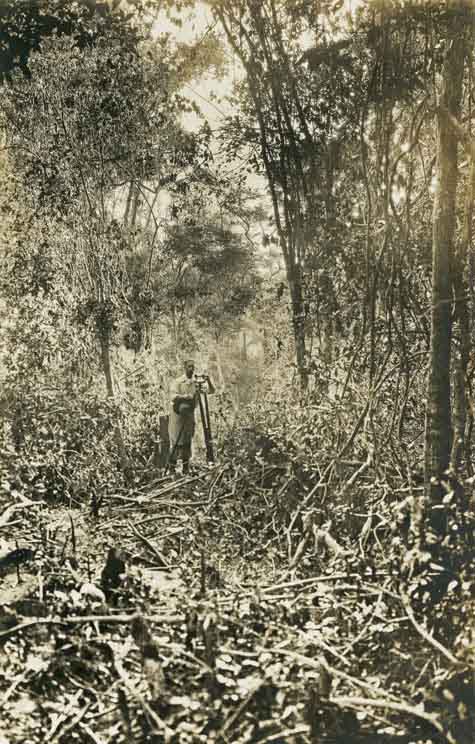
You admit you were a novice when it comes to camping. What were you thinking, and, how many people attempted to talk you out of this journey?
When I first started researching the story, I never thought I would venture into the jungle. I'm out of shape; I hate to camp; I suffer from a degenerative eye condition that makes it hard to see at night. My intention was simply to write Fawcett's biography, and I spent most of my time safely combing through libraries and archives. But one day I tracked down Fawcett's granddaughter, who, at her home in Wales, showed me a large wooden trunk. Inside was a hidden trove of Fawcett diaries and logbooks. They held new clues to Fawcett's fate and the whereabouts of Z. And it was at that point that I decided, despite warnings from others, to head into the jungle.
What is it about these lost societies -- El Dorado, Atlantis -- that intrigue us?
The fascination with lost cities seems eternal. I suspect that part of it, like the earlier searches for mythical kingdoms, such as Prester John, reflects a longing to find some place that is better or richer or more fabulous than the one we inhabit. In 1928, after tens of thousands of people volunteered to search for Fawcett and his missing party, an American newspaper marveled, "Perhaps if there were a sufficient number of jungles available and enough expeditions to go round, we would see the spectacle of our whole population marching off in search of lost explorers, ancient civilizations, and something which it vaguely felt was missing in its life." I also think there is a deep curiosity about how real civilizations, such as the Incas or Mayans, once flourished and eventually died out. Some of this interest is practical: What did these people accomplish that might help us navigate our way? And some of the fascination is simply wonder at how others lived in different places and ages.
At one point, you were literally lost in the jungle. Was there a point that you wanted to quit and go home to your family?
Being lost in the jungle was definitely the most terrifying moment of my journey. At that point I was desperate to turn back, but it was too late: I couldn't find my way out.
What was harder: trekking through the jungle, or actually sitting down to write the book? How long did it take you to finish?
Physically, the Amazon was much tougher, but psychically I'd probably say the book, which took me nearly four years to research and write.
I was going to ask a question along the lines of "Isn't it depressing that there is nothing left to discover -- that there are no more "blank spots on the map" -- but I guess your book makes clear that isn't the case. What do you think is still out there to uncover?
Though Fawcett marked the end of the age of real territorial exploration, there are still relatively unknown places, especially in the Amazon. Even today, the Brazilian government estimates that there are more than sixty Amazonian tribes that have never been contacted by outsiders. Sydney Possuelo, who was in charge of the Brazilian department set up to protect Indian tribes, has said of these groups, "No one knows for sure who they are, where they are, how many they are, and what languages they speak." Archeologists, using satellite imagery and ground penetrating radars to pinpoint buried artifacts, are beginning to make extraordinary discoveries in the Amazon that are overturning virtually everything that was once believed about the region and its early inhabitants.
It seems there was a time when the explorer or the adventurer was THE celebrity. In recent years, Steve Fossett is the first person who comes to mind who may have been on this level. What will it take for the adventurer to become engrained in the public consciousness again? Astronauts going to Mars?
I am not sure if explorers will ever hold the same place in the popular imagination. Fawcett's legend once contributed to radio plays, novels (Evelyn Waugh's A Handful of Dust is believed to have been influenced by Fawcett's saga), poems, documentaries, movies, stamps, children's stories, comic books, ballads, stage plays, graphic novels, and museum exhibits. As I discuss in my book, there were not only geographical circumstances that made these figures legends; there was an array of cultural forces as well.
Do you know of any new expeditions to search for Z?
I don't know of any at the moment. My hope is that the book will have sufficiently cleared up the endless mystery surrounding Fawcett's fate and the City of Z, though undoubtedly someone else will get bitten by the bug and go marching off. Brad Pitt optioned the film rights to the book now adapted into a screenplay.
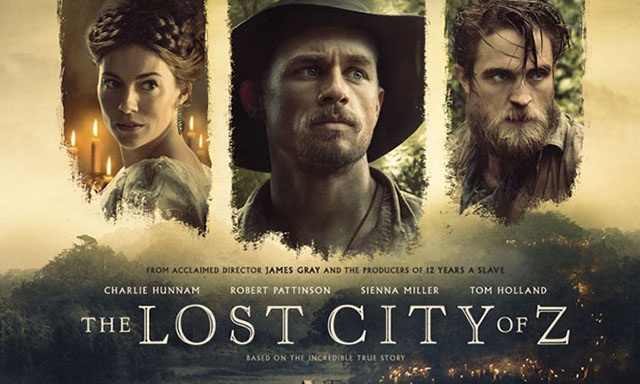
The Lost City of Z

Chronicles of Colonel Fawcett